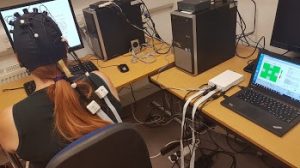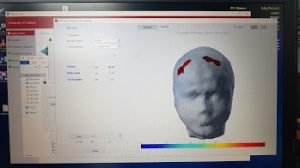In this blog post, recent BSc (Hons) Psychology graduate student Meera Sonara describes her experience of the BPS Psychobiology studentship. Meera and her supervisor Robert Bendall investigated neurocognitive mechanisms underlying emotional attention, by measuring brain activity and eye-movements.
After completing my dissertation in the field of cognitive psychology, I was thrilled to hear that I was accepted for the British Psychology Society Psychobiology studentship, a scheme that funds a second or third year undergraduate student to work alongside a supervisor on a research project for 8 weeks in summer. I was eager to get back into research and explore areas within psychobiology, and with the help of my supervisor, we managed to develop an exciting neurocognitive research project that built upon my dissertation. I couldn’t wait to get started and gain invaluable experience in psychological research.
Week 1-2
It was all hands-on deck during the first week of the BPS Psychobiology studentship as myself and Rob had a lot to get started on. After finalising what we wanted to include in our experimental design and drawing up a plan of action for the next 8 weeks, it was time for me to be trained in the various pieces of equipment I would be using for data collection. PHD researcher and technical wizard Aleksandra Landowska introduced me to the functional near-infrared spectroscopy (fNIRS) brain imaging software, a slightly complicated piece of equipment that somewhat resembles a swimming cap with wires everywhere. However, I soon began feeling more confident with the software by practising setting it up numerous times, which helped me feel ready and excited to have a go at using it myself for data collection.
Soon after, I was also introduced to the eye-tracking software. Being able to see every little eye movement and fixation while viewing different scenes was something that I found particularly interesting, as I was able to visually see our own internal cognitive processes for the first time.
During the second week, I started putting together the stimuli that would be used while assisting Rob in the mechanics of the experiment in E-Prime. Before the internship I didn’t have the chance to learn about how experiments are built in E-Prime, and it turns out that there are so many details involved to ensure that they run smoothly. I learnt about how E-Prime, the eye-tracker and the fNIRS software communicate with each other, received a mini history lesson about parallel ports and started testing out the experiment. It was a lot of trial and error which was quite frustrating at first, but with a little perseverance everything was running perfectly, and I felt incredibly accomplished. By the end of the week, recruitment emails had been sent, the first few participants were booked in and I was raring to go for data collection!
Week 3-6
By week 3, data collection was in full swing. I found these few weeks the most enjoyable and rewarding as it was brilliant to finally see the experiment in action. Of course, there were occasions where either the fNIRS or eye-tracker wasn’t cooperating, however part of the fun of research is having to troubleshoot until you reach that ‘a-ha!’ moment and figure out where the problem lies.
Alongside collecting data, I also began writing the methods section for a research report, ran the @SalfordPsych twitter account for a week and drafted an abstract for the conference poster presentation. There were a variety of tasks to get on with which I thoroughly enjoyed, as it gave me insight into what life as a researcher involves.
Week 7-8
The final two weeks consisted of analysing all the data that I have collected and simultaneously preparing a research poster that details what myself and Rob have been investigating. There was a lot of multitasking, and my time-management skills were pushed to their limits. My roles changed from a day to day basis – one day I’d be analysing the fNIRS data with the aid of Alex and the next day I’d be trying to make sense of the eye-tracking data with Rob. However, as challenging as it was, being able to see what trends emerged in the data, what it all meant and how it can be applicable to the real-world was extremely exciting. I gained new-found confidence in my abilities to work on my own initiative and interpret the various pieces of data. After putting together the final touches to my research poster, all that was left to do was to present it at the BPS Psychobiology Section Annual Scientific meeting!
Throughout my time as an intern, “it’s all part of being a researcher” was a saying that came up time and time again but it’s certainly true. Not everything goes to plan straight away, whether it’s trying to get an experiment to work, whether the equipment spontaneously switches off or whether Microsoft Excel decides to test your patience. With the support of Rob, Alex and not forgetting Sam the technician, we were able to face any difficulties and think outside the box for a solution. I felt very lucky to be surrounded by such hard-working and inspiring researchers who mentored me throughout the whole journey and encouraged me to always persevere.
I would definitely recommend applying for the BPS Psychobiology Internship to any second or third year students looking to challenge themselves and gain hands-on practical research experience. More than anything, the scheme has helped shape my research interests and taught me that with plenty of drive and determination, you can produce a poster that you are truly proud of and sums up everything that myself and Rob have been working tirelessly on. I cannot wait to take the skills and experience that I have gained to a future role in psychological research, and I cannot thank the BPS and the Psychology department enough for giving me this opportunity.


